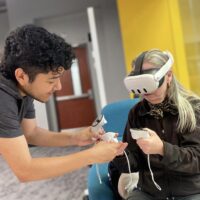Just wrapped up an energizing few days at the HolonIQ + QS 24th Annual Back to School Summit in New York, where I joined an exceptional group of colleagues for a panel on “Navigating Responsible AI in Higher Education: Addressing Student Expectations and Ethical Practices.”
It was a great opportunity to speak alongside:
- Alejandro Caballero, Principal Education Specialist, IFC – The World Bank Group
- Heather Haseley, Managing Director, Institute for Extended Learning at Imperial College London
- Nunzio Quacquarelli, Founder and President, QS Quacquarelli Symonds

Together, we explored how institutions can meaningfully engage with the promises and paradoxes of artificial intelligence in higher education.
Key Questions We Explored
- What opportunities and risks does AI bring to higher education?
- How do we uphold academic integrity in the age of generative AI?
- How can institutions collaborate globally on ethics and governance standards?
- How do we ensure AI closes — rather than widens — existing equity gaps?
A powerful theme that surfaced across the discussion was the tension between AI-driven hyperpersonalization and the risk of dehumanizing learning. It reminded us that responsible AI is not just a technical or policy issue — it’s a design challenge.
We spoke about the need to preserve the art of creativity, empathy, and execution in systems increasingly shaped by automation. If AI is to amplify human potential, it must be designed to enhance the qualities that make education distinctively human.
Building Ethical and Equitable Futures
Our conversation reflected a broader shift in higher education — from reaction to reflection. The challenge is no longer whether AI belongs in education, but how it should behave within it.
This requires cross-sector collaboration on:
- Ethical frameworks that prioritize transparency, consent, and shared agency.
- New assessment paradigms that value process over output.
- Institutional learning ecosystems that integrate AI literacy, not as an add-on, but as a core competency.
Gratitude and Next Steps
Deep gratitude to HolonIQ, QS, and all the remarkable voices that made this dialogue so rich — including Jerry Wind, Maria Spies, John Holdcroft, Miguel Amigot II, John Sherman, Tanmay Yadav, Kendra Sharp Deas, Ph.D., Nimesh Shah, Angelo Victor Mercure, and Nitin Sethi.
It’s clear that the work ahead is not about regulating innovation, but reimagining it responsibly — ensuring AI helps education become more open, equitable, and imaginative than ever before.




